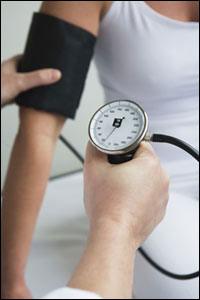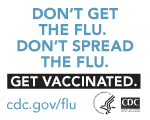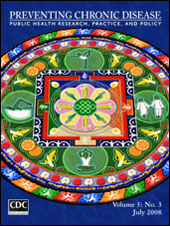CDC Features
Get Screened

A health test given to an individual with no sign of the disease in order to detect or reduce the risk of the disease or its complication is called a screening test.
Why Screen for Disease if You Are Seemingly Healthy?
Screening procedures play important roles in health protection. Even when you feel fine, some screening procedures may enable you to prevent disease or detect a problem in its early and most treatable stages. For example, people with high blood cholesterol have a greater chance of getting heart disease. The results of a blood test could alert an individual to take steps to reduce the risk of developing heart disease.
Which Screening Tests Do I Need?
Screening tests vary based on the particular disease. For example, questionnaires are used to screen for depression. Laboratory tests screen for many conditions such as cervical cancer, diabetes, and high cholesterol. Since guidelines for screening vary and are often based on age, sex, and risk factors for the disease you should ask your doctor which tests are right for you.
Some Widely-used Screening Tools
• Glucose Test
Diabetes is a disease in which blood glucose levels are above normal. When you have diabetes, your body either doesn't make enough insulin or can't use its own insulin as well as it should, causing sugar to build up in your blood. Physicians can diagnose diabetes through a blood glucose test. In addition, oral glucose testing can be administered to screen for people with prediabetes, a condition that puts people at high risk for developing diabetes. Diabetes is the seventh leading cause of death and can lead to complications such as heart disease, blindness, kidney failure, and amputations. People who have diabetes are at increased risk for these and other complications. For more information about diabetes, see CDC's Division of Diabetes Translation.

• Body Mass Index (BMI) Calculation
Body Mass Index (BMI) is a number calculated from a person’s weight and height. BMI provides a reliable indicator of body fatness for most people and is used to screen for weight categories that may lead to health problems. Being overweight or obese increases the risk of developing many diseases such as hypertension, type 2 diabetes, heart disease, and some cancers. You can compute your BMI at CDC's nutrition and physical activity program Web site.
• Dental Exams
An oral examination by a dentist is used to screen for a variety of conditions. Mouth and throat diseases, which range from cavities to cancer, can cause pain and disability. Even when there is no pain, a problem in the mouth can signal trouble in other parts of the body. Read more on oral health.
• Blood Pressure Monitoring
High blood pressure, also known as hypertension, is a major risk factor for heart disease and stroke. You can find out if you have high blood pressure by having your blood pressure checked regularly. See this high blood pressure fact sheet.
• Mammograms, Pap Tests, and Cancer Screening Tools
The routine performance of screening tests, such as mammograms and pap tests, may find many kinds of cancer early, when treatment is likely to work best. See these preventive cancer screening guidelines.
Getting screened, eating a healthy diet, exercising, and avoiding cigarette smoke are important protective behaviors. For more information on healthy behaviors, read the July 2008 issue of Preventing Chronic Disease. Articles in the issue include:
• Impact of Periodic Follow-Up Testing Among Urban American Indian Women With Impaired Fasting Glucose
Page last updated: June 23, 2008
Content source: National Center for Chronic Disease Prevention and Health Promotion
Content owner: National Center for Health Marketing
URL for this page: www.cdc.gov/Features/GetScreened



